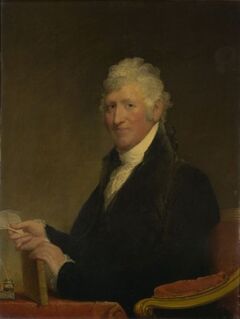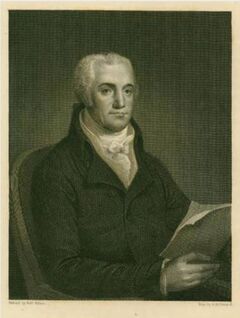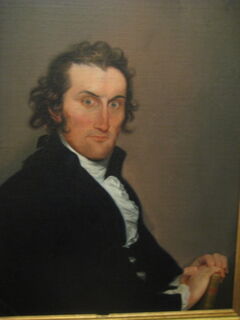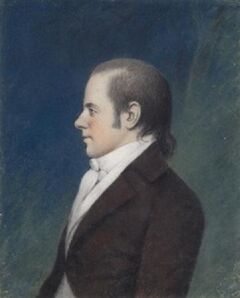
Old State House, Hartford, Connecticut (built 1796). Photo by Everett H. Keeler, 1937. Courtesy Wikimedia Commons.
The Hartford Wits (also called the Connecticut Wits) were a group of young writers from Connecticut, centered first around Yale College and later in the city of Hartford, who flourished in the last quarter of the 18th century.
History[]

John Trumbull (1750-1831).
1760's and 1770's[]
The group began with John Trumbull, a child prodigy born in Watertown in 1750, who passed an entrance examination to Yale at 7 years of age, and enrolled in the College at 13. Two years later he met Timothy Dwight IV, who had enrolled that year (also at 13), and the two went on to befriend later students David Humphreys and Joel Barlow.[1]
After graduating the 4 remained at Yale, teaching and tutoring. By the 1770's they were all writing poetry.[1] Their writings satirized an outmoded curriculum and, more significantly, society and the politics of the 1770's and 1780's.

Timothy Dwight (1752-1817).
Trumbull first set out the goals of the group in a long poem, The Progress of Dulness (a satire on higher education), and an "Essay on the Use and Advantages of Fine Arts." In the essay, he foresaw the emergence of an American literary tradition capable of rivaling the great civilizations of the past. The Progress of Dulness established a tone and style that later defined the poetry of the Wits: satire, understated humor, and puncturing the pretenses of the self-important and powerful;[1] what the Encyclopædia Britannica has called, "burlesque verse modelled upon Samuel Butler’s Hudibras and Alexander Pope’s Dunciad."[2]

David Humphreys (1752-1818).
Trumbull also exhibited a belief in egalitarianism that eventually became a Wit hallmark in, for example, poems that called for the abolition of slavery and full education rights for women. The latter theme is already on display in “The Progress of Dulness” in the characterization of Harriet Simper, who is told to prioritize clothes, appearance, and finding a husband despite obvious intellectual abilities.[1]

Joel Barlow (1754-1812).
"When the British started taxing their American Colonies," writes Matthew Richardson, "Trumbull and other men of Connecticut chose the pen and the creation of poetry as their primary weapon against perceived tyranny. Connecticut's poets wrote epic poems, mock epic poems, satiric poems, elegies, and odes."[3] The Wits supported the cause of the American Revolution not just by their pens but by their actions: Humphreys and Barlow joined the Continental army and Dwight, who had became a minister, served as chaplain to the Connecticut Continental Brigade. Trumbull, the only one who did not join, wrote a popular long poem, M'Fingal, that mocked the loyalist mindset.[1]
After the war, Trumbull, Barlow, and Humphreys settled in Hartford, Connecticut, where they were joined by Lemuel Hopkins and Richard Alsop, and the group became known as the "Hartford Wits."[1] In their writings, the wits advocated a strong, conservative central government and attacked such proponents of democratic liberalism as Thomas Jefferson.[2]
The Anarchiad[]

Lemuel Hopkins (1750-1801).
Their dissatisfaction with the Articles of Confederation appeared in The Anarchiad (1786–1787), written by Humphreys, Barlow, Trumbull, and Hopkins. In satirizing democratic society, this mock-epic promoted the federal union delineated by the 1787 Federal Convention at Philadelphia.[4]
The Anarchiad was published in portions in the Connecticut Magazine, during 1786 and 1787. It is a political satire, referring to the state of the country at the period immediately preceding the adoption of the federal constitution. The American states were at that time loosely connected, each pursuing its own separate policy, without any regard for the plans of the other members of the confederacy, or the general welfare of the country. This led to embarrassments in the public affairs, which by the instrumentality of factious and violent persons, occasioned great disorders. Against the promoters of these political troubles, the Anarchiad is pointed.[5]
The poem is represented in the introduction as having been discovered in digging among the ancient aboriginal fortifications in the western country, and by the aid of vision and prophecy, it is made to bear on modern events. A strain of grave moral expostulation is mixed up with satirical touches in a very able manner. Hopkins suggested the plan of the work, and has always borne the credit of having written the most striking passages.[5]
The Echo[]
Main article: The Echo
American Poems[]

Elihu Hubbard Smith (1771-1798).
American poet and editor Dr. Elihu Hubbard Smith practiced medicine in the town of Wethersfield, Connecticut, for roughly 2 years, 1792-1794. During this period Dr. Smith first became known in a literary character: He was received by the Hartford poets into their most intimate society; and "although associated but in a slight degree with their literary labors, he was nevertheless a member of their brotherhood."[6]
In 1793, Smith published the anthology American Poems: Selected and original in Litchfield, Connecticut. The volume contained writing by all of the Wits – Trumbull, Dwight, Barlow, Humphreys, Hopkins, and Alsop – and other authors, "and also many anonymous poems, selected from the newspapers of the day, as possessing peculiar merit. It was the first general collection of poetry ever attempted in the country, and the literature of that day is indebted to its editor."[6]
Later careers[]
The Wits eventually followed their interests in divergent directions. After The Anarchiad, Trumbull turned his attention to law and politics, serving as county attorney and state Superior Court judge. Humphreys also went into politics, becoming minister to Portugal and then Spain. Dwight became president of Yale in 1795. Barlow ultimately repudiated the Federalist politics of the Wits altogether.
Writing[]
"Although the wits sought to demonstrate the possibility of a genuinely American literature based on American subjects," says the Britannica, "they conventionalized styles of early 18th-century British verse, and the works that they produced are generally more notable for patriotic fervour than for literary excellence."[2]
Matthew Richardson notes that "Given the poetic forms and the use of poetry as a weapon against a corrupt government as other neoclassic writers, like Swift, Pope, and Thompson, most scholars place all of the Connecticut poets into the" Augustan or "neoclassical era of poetry." In this they follow the lead of William Dowling, author of Poetry and Ideology in Revolutionary Connecticut:
- Dowling argues that the literary circle known as the Connecticut or Hartford Wits were ideologues that wrote satirical poems similar to British poets from a generation before like Swift, Pope and, Bolingbroke. He called the Connecticut Wits' poetry "literary Augustanism." This assertion would place the Hartford Wits perfectly into the neoclassic period.[3]
Richardson argues that, while the Wits were "mostly neoclassic,"
- there were also elements of Romanticism, sometimes even in the same poem. In the fine art from Connecticut one will find themes, forms, and styles that are usually associated with Romantic art. For example, some of the Connecticut Wits wrote sonnets. The poetry in Connecticut displays enough Romantic style to refrain from referring to it as purely neoclassic. The Connecticut or Hartford Wits took the poetry in Connecticut slowly from neoclassic poetry to Romantic poetry.[3]
Select Publications[]
Poetry[]
- John Trumbull, McFingal: A modern epic poem, in four cantos. Philadelphia: William & Thomas Bradford, 1775; London: J. Almon, 1776; Hartford, CT: Hudson & Goodwin, 1782; Boston: Peter Edes, 1785; London: J.S. Jordan, 1792; London: Chapman, 1793; New York: John Buel, 1795; Boston: Ebenezer Larkin, 1799; Elizabethtown, NJ: Woorruff & Penam, 1805; New York: E. Low, 1810; Baltimore, MD: A. Miltenberger, 1812; Albany, NY: E. & E. Heaford, 1813; Lexington, KY: William Essex & H.C. Sleight, 1814; Hudson, NY: E. Norman, 1816; Philadelphia: C.P. Fessendon, 1839; Hartford, CT: Hudson & Goodwin, 1900; Hallowell, ME: Ezekiel Goodale, 1900.[7]
- David Humphreys, A Poem Addressed to the Armies of the United States of America. New Haven, CT: T. & S. Green, 1780.[8]
- David Humphreys. Joel Barlow, John Trumbull, & Lemuel Hopkins, The Anarchiad: A New England poem, 1786-1787. New Haven, CT: New Haven Gazette and Connecticut Magazine, October 26th, 1786 - September 13, 1787;[9]
- (with preface by Luther G. Riggs). New Haven, CT: Thomas H. Pease, 1861; Gainesville, FL: Scholars' Facsimiles & Reprints, 1967.[7]
- Joel Barlow, The Conspiracy of Kings: A poem, addressed to the inhabitants of Europe. London: J. Johnson, 1792.[10]
- Richard Alsop, Aristocracy: An epic poem. Philadelphia: privately published, 1795.[11]
- Lemuel Hopkins, Guillotina; or, The annual song of the tenth muse: Addressed to the readers of the 'Connecticut Courant'. Hartford, CT: Hudson & Goodwin, 1795
- also published as The Guillotina; or, A Democratic dirge: A poem. Philadelphia: printed by Thomas Bradford, 1796.[12]
- Richard Alsop, Lemuel Hopkins, John Trumbull, et al, The Echo, with other poems. New York: Porcupine Press, by Pasquin Petronius, 1807.[11]
Anthologized[]
- American poems: Selected and original (edited by Elihu Hubbard Smith). Litchfield, CT: Collier & Buell, 1793
- (with introduction by William K. Bottorf). Gainesville, FL: Scholars' Facsimiles & Reprints, 1966.[13]
See also[]
References[]
- ↑ 1.0 1.1 1.2 1.3 1.4 1.5 Andy Piascik, "The Hartford Wits," Connecticut History Online. Web, Nov. 21, 2016.
- ↑ 2.0 2.1 2.2 Hartford Wit, Encyclopedia Britannica, Encyclopedia Britannica Inc. Web, Nov. 21, 2016.
- ↑ 3.0 3.1 3.2 Matthew Richardson, "{Connecticut Wits: Intimations of American romanticism]," Varsity Tutors. Web, Nov. 21, 2016.
- ↑ Saillant, John. "Hartford Wits." Dictionary of American History. Ed. Stanley I. Kutler. 3rd ed. Vol. 4. New York: Charles Scribner's Sons, 2003. 101-102. Gale Virtual Reference Library. Web. 7 May 2012.
- ↑ 5.0 5.1 Samuel Kettell, "Critical and Biographical Notice: Lemuel Hopkins (1750–1801)," Specimens of American Poetry, Boston: S.G. Goodrich, 1829. Bartleby.com, Web, Nov. 21, 2106.
- ↑ 6.0 6.1 Charles Everest, "Elihu Hubbard Smith," Poets of Connecticut (1843), 1205-107. English Poety, 1579-1830, Center for Applied Technologies in the Humanities, Virginia Polytechnic Institute & State University. Web, Nov. 21, 2016.
- ↑ 7.0 7.1 Search results = au:John Trumbull, Worldcat, OCLC Online Computer Library Center Inc. Web, Dec. 2, 2013.
- ↑ Search results = au:David Humphreys 1818, WorldCat, OCLC Online Computer Library Center Inc. Web, July 17, 2016.
- ↑ Anarchiad: A New England poem, 1786-1787, American Verse Project. Web, Nov. 21, 2016.
- ↑ Search results = au:Joel Barlow, WorldCat, OCLC Online Computer Library Center Inc. Web, Nov. 22, 2016.
- ↑ 11.0 11.1 Search results = au:Richard Alsop, WorldCat, OCLC Online Computer Library Center Inc. Web, Nov. 21, 2016.
- ↑ Search results = au:Lionel Hopkins, WorldCat, OCLC Online Computer Library Center Inc. Web, Nov. 21, 2012.
- ↑ Search results = au:Elihu Hubbard Smith, WorldCat, OCLC Online Computer Library Center Inc. Web, Nov. 21, 2016.
External links[]
- Poems
- Books
- The Anarchiad at the American Verse Project
- American Poems: Selected and original. Volume I at Internet Archive
- About
- Hartford Wit in the Encyclopædia Britannica
- The Hartford Wits at Connecticut History
- "Connecticut Wits: Intimations of romanticism" at Varsity Tutors
Original Penny's Poetry Pages article, licensed under Creative Commons Attribution-Share Alike License 3.0.